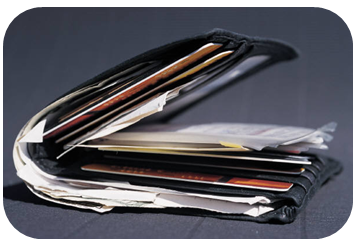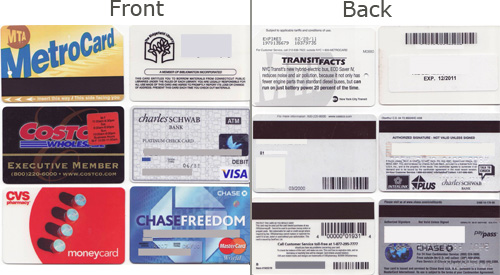Alright, it’s gone. Deep breath. We’ll get through this. Here’s the quick bullet list of steps to take, followed by a detailed plan.
- Make sure it’s really gone. If you find it, your life becomes instantly amazing.
- File police report
- Create a wallet inventory? (list of what was in your wallet)
- Cancel Lost Credit and Debit card(s)
- Contact other companies relating to lost items (e.g. Insurance card, monthly metro cards)
- Contact national credit bureaus
- Check credit report
- Contact DMV if your driver’s license was lost
- Miscellaneous (SSN, passport, birth certificate, keys)
1. Double Check
First, make sure your wallet is really gone. Retrace your steps and call people you’ve recently been around with to see if they have it. Found it? Great! Still nothing? Move on to step 2.
2. Police Report
Call the local police where the wallet was lost and file a report. Google “[City], [State] Police Department” to find your local police’s phone number (for example “Ridgefield, CT Police Department”. While the police likely won’t be able to help you recover the lost or stolen wallet, the report will be helpful down the line if there are fraudulent credit card charges made in your name. Keep a copy of the report.
3. Wallet Checklist
It’s time to make a checklist of all the items you think you had in your wallet and start contacting them one by one. Think back to all the different pockets and compartments in your wallet and write down each item that you can remember. Here are some common items to jog your memory:
- Credit cards (including individual store cards)
- ATM and Debit card
- Insurance card
- Driver’s license
- Frequent shopper cards
- Membership cards (e.g. Costco, BJ’s, CVS)
- Subway/Metro/Train cards
- Gift certificates
4. Credit/Debit Cards
If the card is long gone, call your credit and debit card companies to alert them of the loss. They will cancel the card and mail you a new one in a 3-5 business days. It’s always worthwhile to ask the bank if they can expedite the shipment of the card. The bank only makes money when the card is in your possession, so they’ll usually send it next-day air for free – IF you ask. You can use this script:
Common Credit Card Numbers:
- American Express: 800.950.5114
- Bank of America: 800.732.9194
- Capital One: 800.955.7070
- Chase: 800.436.7927
- Citi 800.950.5114
- Discover: 800.347.2683
Common Debit Card Numbers:
- Bank of America: 800.432.1000
- Charles Schwab: 888.403.9000
- Chase Debit: 800.935.9935
- Citi 800.950.5114
- HSBC: 800.975.4722
- ING Direct: 877.464.1777
- TD: 888.751.9000
Note: When calling your card companies, they’ll ask you the time, location and amount of your last legitimate purchase to help assess the situation. Try to remember that information prior to calling.
5. Contact Companies
If your insurance card is lost, you can usually print out a temporary ID on your insurance company’s website. You should also call them to report the card as lost/stolen. Google your insurance company’s name to find their contact number. Go back to your wallet itemized list and contact any other companies. Some common wallet items: monthly metro card, gift cards, department store credit cards, library cards, and frequent shopper cards. There is no liability protection for charges occurring on your rental accounts (e.g. library, Blockbuster) – so you’ll likely be billed for any charges made to your account.
6. Credit Bureaus
Your chances of identity theft are increased when your personal information is missing (i.e. driver’s license). Ask anyone who’s had their identity stolen and gone through the painful recovery process and (potentially) thousands of dollars in fees….it’s better to be safe than sorry. Call up one of the three key credit agencies and place a “fraud alert” on for your name and Social Security Number (note: you only need to report to one of the agencies because they are required by law to automatically report to the other two). This adds a layer of identity theft protection.
If the agencies receive any inquiries for a new credit application, they will be aware of the recent theft and contact you directly to confirm it was really you who applied. For example, if a thief tries to open a credit card under your name after you place a fraud alert, you will receive a call before the card is opened – saving yourself headaches down the road. This initial alert will stay in place for 90 days after you call. You can also request an extended alert which will stay on file for 7 years.
Credit agency numbers (notify ONE agency and the other two will be notified automatically):
- Equifax: 800.525.6285 or www.equifax.com
- Experian: 888.397.3742 or www.experian.com/fraud
- TransUnion: 800.680.7289 or www.transunion.com
7. Credit Report
Even if your wallet wasn’t deliberately stolen, it’s still a good idea to check your credit report for any fraudulent activity CreditKarma.com is a great site that will show recent credit activity and also provide a free credit score. I use this site to monitor my credit activity and score on a monthly basis. It also has suggestions on ways to improve your credit score.
8. Driver’s License
If your driver’s license is lost or stolen, you should alert the Department of Motor Vehicle. DMV.org is a useful site that provides step by step instructions, state-by-state fees and links to get your new license. Luckily, many states allow you to request a replacement license online – so you don’t have to wait on line at the DMV for 9 hours.
9. Miscellaneous
Here’s what to do if your Social Security Card, Passport or Birth Certificate are stolen with your wallet. For the future, NEVER keep this stuff in your wallet
- Social Security Card: Call the SS administration immediately: 800-269-0271
- Passport: First, you need to report the passport as lost or stolen using a DS-64 Government Form. Second, you need to obtain a replacement. This needs to be done in person at Passport Agency (usually an office in a major city) or Passport Acceptance Facility (local post office). Check out the US Dept of State’s website for exact details.
- Birth Certificate: You’ll have to contact the Vital Records Office in the state where you were born. VitalRec.com has specific instructions and contact information for all 50 states. Some states also allow online ordering. There are fees associated with the request, ranging from $10 to $60.
Keys: If your keys were lost with your wallet, you should consider changing the locks. Usually, your home address is somewhere in your wallet (license or business card), pointing a potential thief right to your home. You can change the lock cylinder on your house locks.
Bonus Tips: What to do before you lose your wallet.
Here are a few tips to put in place before you lose your wallet
- Make a Wallet Inventory
- Minimize Clutter
- Register gift cards for retrieval
- Make your wallet returnable
1. Wallet Inventory
Let’s face it, we usually have no clue what’s actually in our wallets. When our wallet is lost or stolen, stress levels rise and make it even harder to remember what we lost.
You need to take a “wallet inventory”. My preferred method is taking a taking a picture of all the items in your wallet, both front and back. Email the pictures to yourself with the subject “Wallet Inventory” and archive so you can easily find it again. This takes 5 minutes now, and will save you hours of time when your wallet is lost.
2. Minimize Clutter
While carrying around a wallet the size of a paving brick may seem like a good idea, it isn’t. Cut down on the weight and clutter, and increase your safety at the same time. We don’t need 80% the stuff we carry around. I know, you’re thinking “but I never know when I’ll need that $1.34 Best Buy gift card”. The answer to that riddle is never. Take out your wallet right now and meticulously comb through every item one-by-one and decide if you NEED to have it with you at all times. If it takes you more than 3 seconds to decide, you DON’T NEED TO CARRY IT AROUND.
A guide for essential wallet items:
- 1 credit card and 1 debit card
- Drivers license
- Frequently used membership cards (e.g. library and grocery store)
…and that’s it. While the average American has over 5 credit cards, they shouldn’t all be in our wallets. This just makes the cleanup harder when your wallet is lost. In fact, it’s very convenient to store alternative cards in a safe location at home. If your “backup” cards are ever lost, you’ll still have the backup cards to make purchases while the primary cards are replaced.
There are some items that should NEVER be kept in your wallet:
- Social Security Card
- Passport
- Birth Certificate
It’s easy to get into the habit of carrying around these items. Keep these items stored in a bank safety deposit box or another safe location at home. If your wallet is stolen by someone with intentions of identity theft, a SS card, passport or birth certificate is like finding a key to the city.
3. Gift Cards
If you keep high value gift cards in your wallet (not recommended!), make sure you register the gift cards on the company’s web site in case it is lost. Not all retailers do this, but its worthwhile investigating.
4. Make it returnable
When wallets are mistakenly left in a public place, there’s always a chance that a cool/awesome/amazing person will contact you to return the wallet. It’s not always easy to trace down a person to return the lost wallet. Often times, the driver’s license address is out of date and there is no other way to contact the person. I recommend leaving your twitter handle or Facebook link to make it easier for a lost wallet to find its way back to you. On a blank piece of paper, write “If this wallet has been lost, please contact (your twitter handle) or (your Facebook URL)”. This makes it very simple for the wallet hero to reach out to you and arrange a return.




Quite useful.
I have lost my wallet several times over the years. I do admire the folks that go out of their way to return a lost wallet that they have found. Most of the time I don’t ever get the wallet back but there have been a couple of times when someone contacted me and returned it and I always make it worth their while.